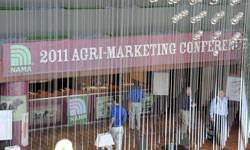 The AgWired App is now available in the Android Market. You asked for it and you’ve got it. One of the new features we’re offering in this app (and soon to be added to the iPhone version) is the ability to share out stories via multiple mechanism like email, Twitter, etc. The first person to download the AgWired Android App to his phone was Deron Johnson, Rhea & Kaiser (AgWired sponsor), just prior to the student activities at the Agri-Marketing Conference.
The AgWired App is now available in the Android Market. You asked for it and you’ve got it. One of the new features we’re offering in this app (and soon to be added to the iPhone version) is the ability to share out stories via multiple mechanism like email, Twitter, etc. The first person to download the AgWired Android App to his phone was Deron Johnson, Rhea & Kaiser (AgWired sponsor), just prior to the student activities at the Agri-Marketing Conference.
 Just like its iPhone predecessor, the app offers one-touch access to all the latest news and information in the agribusiness and agricultural marketing world posted on Agwired.com, including audio, photos and video, and connections to other ZimmComm news sites. The AgWired App features a news tab drop down menu to select ZimmComm News Network feeds as well as individual news on AgWired.com by category.
Just like its iPhone predecessor, the app offers one-touch access to all the latest news and information in the agribusiness and agricultural marketing world posted on Agwired.com, including audio, photos and video, and connections to other ZimmComm news sites. The AgWired App features a news tab drop down menu to select ZimmComm News Network feeds as well as individual news on AgWired.com by category.
You can find the AgWired App in the Android Market with this link. The AgWired iPhone App has been downloaded onto almost 3,000 iPhones/iPod touches/iPads since we introduced it and is being opened for viewing between 3 to 5 times per day, showing a high level of use by those who have it.
I’ve been asked who we worked with to develop the AgWired App and will point you to rock solid mobile app developer WillowTree Apps.
App sponsors are being sought. Contact ZimmComm for more information, including rates. First time and early sponsor discounts available.




 This app just in … the NAMA App!
This app just in … the NAMA App!


